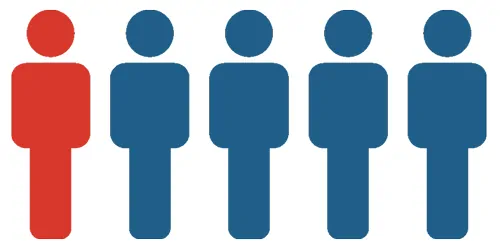
YOU ARE NOT ALONE!
Nearly 1 in 5 adult Americans experience a mental illness.

How common are mental illnesses?
Mental illnesses are among the most common health conditions in the United States.
- Centers for Disease Control
Yes.
A person’s mental health can change over time, depending on many factors. When a person has too many demands placed on them, it can exceed their resources and coping abilities. This affects their mental health. For example, if a person is stressed about their job, facing financial hardship, or caring for a sick relative, they may experience poor mental health.
Centers for Disease Control
Welcome
Welcome to this guide on Mental Health in the Quad Cities. This guide contains information that should help you navigate the resources that are available in the Quad Cities. In this guide, you will find information about the types of mental illnesses, substance abuse, treatment, providers, suicide prevention, and organizations that offer support. Please note that information is always changing. The organizations and providers will always have the most up-to-date information. Hopefully, this guide can help you on your journey to wellness. If you are experiencing a medical emergency, call 911.

Common Warning Signs of Mental Illness
Eating or sleeping too much or too little
Pulling away from people and usual activities
Having low or no energy
Feeling numb or like nothing matters
Having unexplained aches and pains
Feeling helpless or hopeless
Smoking, drinking or using drugs more than usual
Feeling unusually confused, forgetful, on edge, angry, upset, worried, or scared
Yelling or fighting with family and friends
Experiencing severe mood swings that cause problems in relationships
Having persistent thoughts and memories you can't get out of your head
Hearing voices or believing things that are not true
Thinking of harming yourself or others
Inability to perform daily tasks like getting to work or school
Substance Abuse and Mental Health Services Administration

Mental health includes our emotional, psychological, and social well-being. It affects how we think, feel, and act. It also helps determine how we handle stress, relate to others, and make choices. Mental health is important at every stage of life, from childhood and adolescence through adulthood.
Over the course of your life, if you experience mental health problems, your thinking, mood, and behavior could be affected. Many factors contribute to mental health problems, including:
- Biological factors, such as genes or brain chemistry
- Life experiences, such as trauma or abuse
- Family history of mental health problems
Center for Disease Control

Mental and physical health are equally important components of overall health. Mental illness, especially depression, increases the risk for many types of physical health problems, particularly long-lasting conditions like stroke, type 2 diabetes, and heart disease. Similarly, the presence of chronic conditions can increase the risk for mental illness.
Center for Disease Control